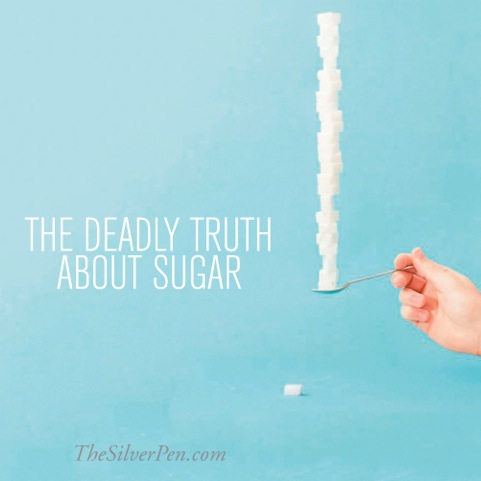Ever heard someone say: “Buy Agave Nectar over honey because it’s much healthier! It’s a natural sweetener.” I so bought into this claim, but the truth of the matter is that it couldn’t be further from the truth. Sorry to be the bearer of bad news. Golly…I wish wish wish it were true. But it isn’t. There is just way too much conflicting information going around about the effects of sugar and how good or how bad it is for our bodies (mainly bad, by the way. Again, sorry).
Here are a list of 7 things that are extrememly important (and true!) to know about sugar.
1. By nature, sugar is duplicitous. When talking about “sugar” we are primarily referring to table sugar… you know, the stuff that is typically derived from sugarcane or beets. It’s also commonly called sucrose, which is made up of about 50% glucose and 50% fructose. It is REALLY important to know the difference bewteen “gluc” and “fruct” as they are processed much differently in the body.
2. Fructose=Fat There is no way around this one. Fructose is straight up terrible for you. Unlike glucose which is processed in your gut and can be used by every cell in your body, fructose bypasses your stomach and goes straight to your liver. Some of the fructose gets stored as glycogen but more often your body turns the fructose into triglycerudes (a/k/a FAT!). This wouldn’t be a big deal if food these days weren’t completely and sneakily loaded with it. Another tip to be aware of is that fructose in it’s purest form is actually 70% sweeter than table sugar, which of course makes it that much more addictive!
3. Sugar is addictive. Knew that one already, didn’t you? Heaven knows I know this! Sugar has the power to mess with our dopamine receptors which means that in order to get the next dopamine spike you need to consunme a greater dose of sugar than the serving before. That’s why over 600,000 food products are laced with some form of sugar because 1.) it’s cheap and 2.) it keeps you coming back for more. Yucky. Yucky. Yucky.
4. Fructose is a chronic liver toxin. Eating too much fructose is becoming more and more commonly associated with chronic diseases such as slower metabolism, heart disease, higher cholesterol, fattyliver diease, obesity, hypertension, etc. The list just goes on and on! One of the scariest things that fructose can do is cause leptin resistance which is the hormone that tells you whether or not you are full. If you break this switch, then hunger control will become very, VERY difficult.
5. Stripping fiber from foods leads to increased sugar to our system. Normally plants with fructose are equipped with fiber which acts as a safeguard in your body. Fiber slows down digestion and the absorption of fructose. However, with the juicing craze that’s going around (which don’t get wrong there are MANY benefits to juicing!) and the breeding of fruits for more sweetness and a longer shelf life, fiber is being destroyed in these natural foods and in turn increasing the body’s sugar consumption. By the way, the ONLY juice that I drink is all green juice. Though it took a little getting used to, the benefits (not having sugar) far outweighed the challenges (getting used to the taste).
6. “Natural” sugar is misleading. Don’t fall for it! Just because fructose is present in whole fruits, veggies, seeds, and nuts DOES NOT mean that it is good for you. Here is a list of common “natural” sweeteners that really are sneakily housing high amounts of fructose:
- Agave nectar = 56-97%
- High fructose corn syrup = 42-90%
- Tapioca syrup = 55%
- Table sugar / cane sugar / beet sugar = 50%
- Honey = 38-50%
- Coconut sugar = 38-48.5%
- Yacon syrup = 35%
- Maple syrup = 30%-45%
- Molasses = 23%
7. Just because sugar has a low glycemic index (GI), it doesn’t mean it’s good for you. The GI scale was created to see how high your blood glucose rises after ingesting 50 grams of carbs of a specific food. 50 grams?!!! That’s alot. Here’s a bit of perspective. Carrots are high in GI, but to get 50 grams of carbs from carrots you would have to eat 1.3 pounds! Therefore, it is really not an effective scale to measure with. So don’t use it to justifiy your sugar consumption. Also, as said before, sugar is often times more than just glucose. All sugars weren’t created equally; they metabolize differently in the body and they each have their own ramifications if eaten too liberally.
Like I said, sorry to be the bearer of bad news here. But the Silver Lining is that once you’re off the stuff, you will feel oh so so so much better!!
*Sugar facts from Mind Body Green



You are a “big” person, admitting when you are wrong & trying to fix it, stay well my friend & keep up the good fight. We do appreciate your wise words.
Thanks so much, Joan! xxxx